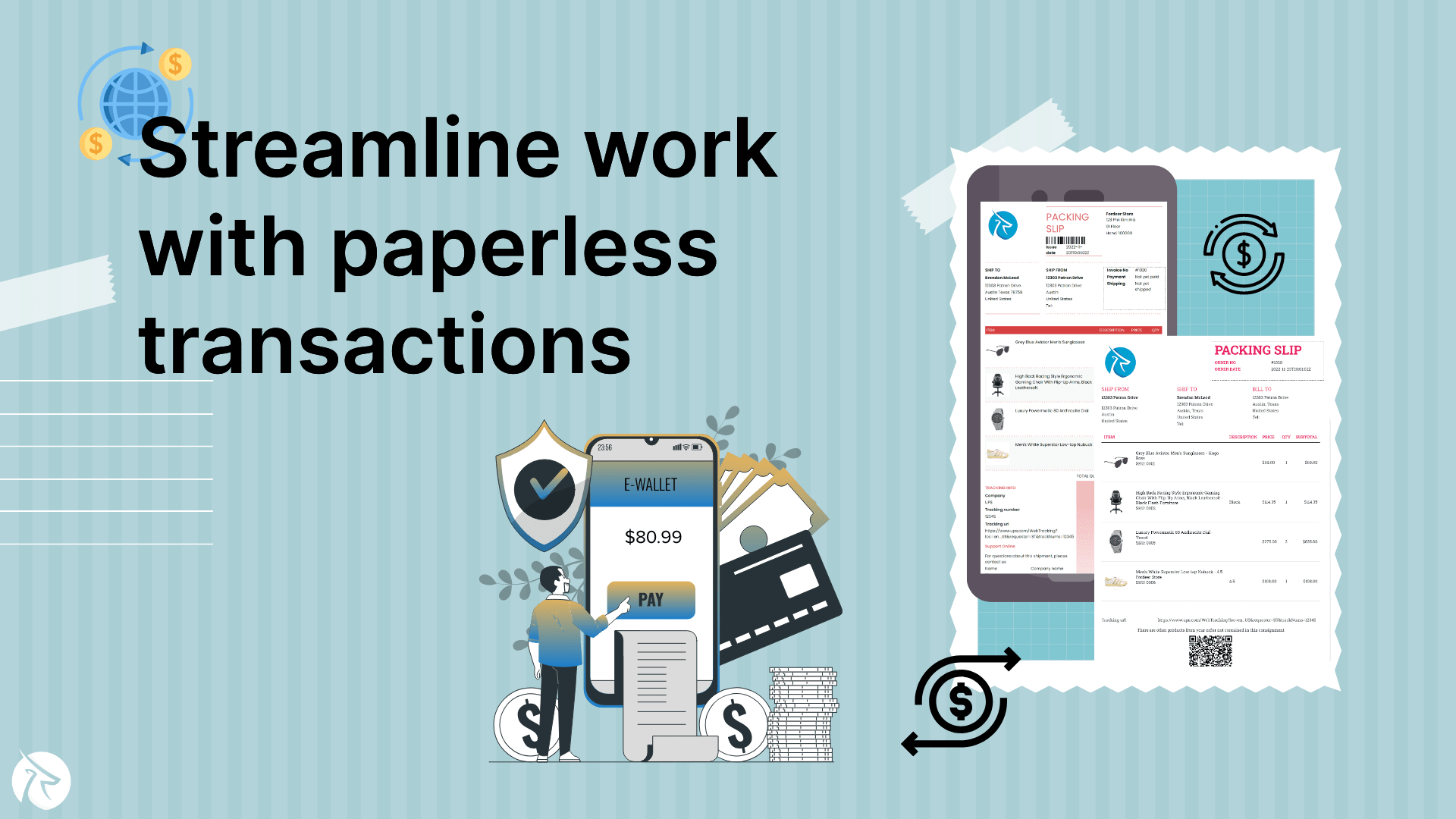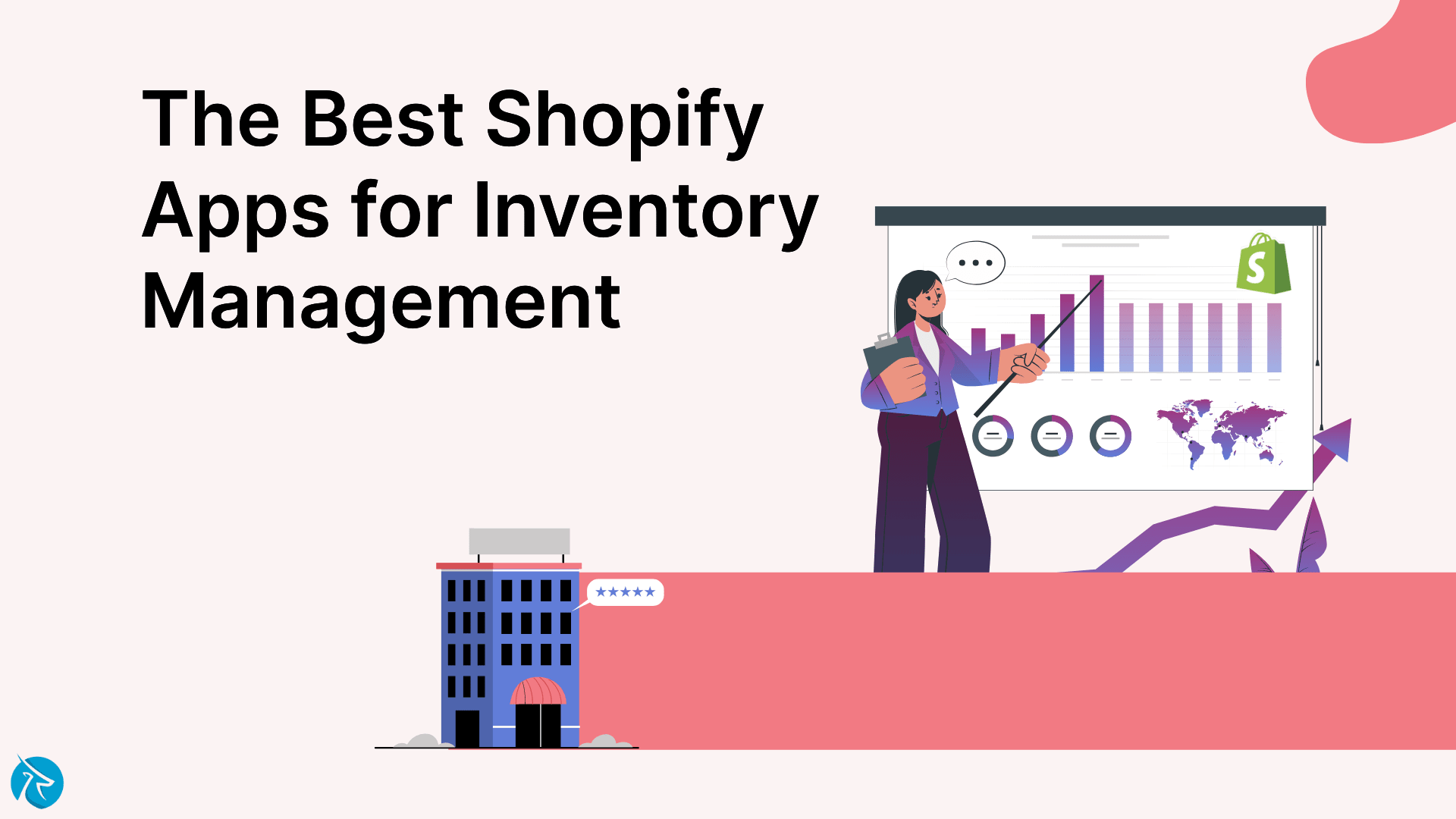Shopify Invoice Generator and Canadian Tax Regulations: GST & HST
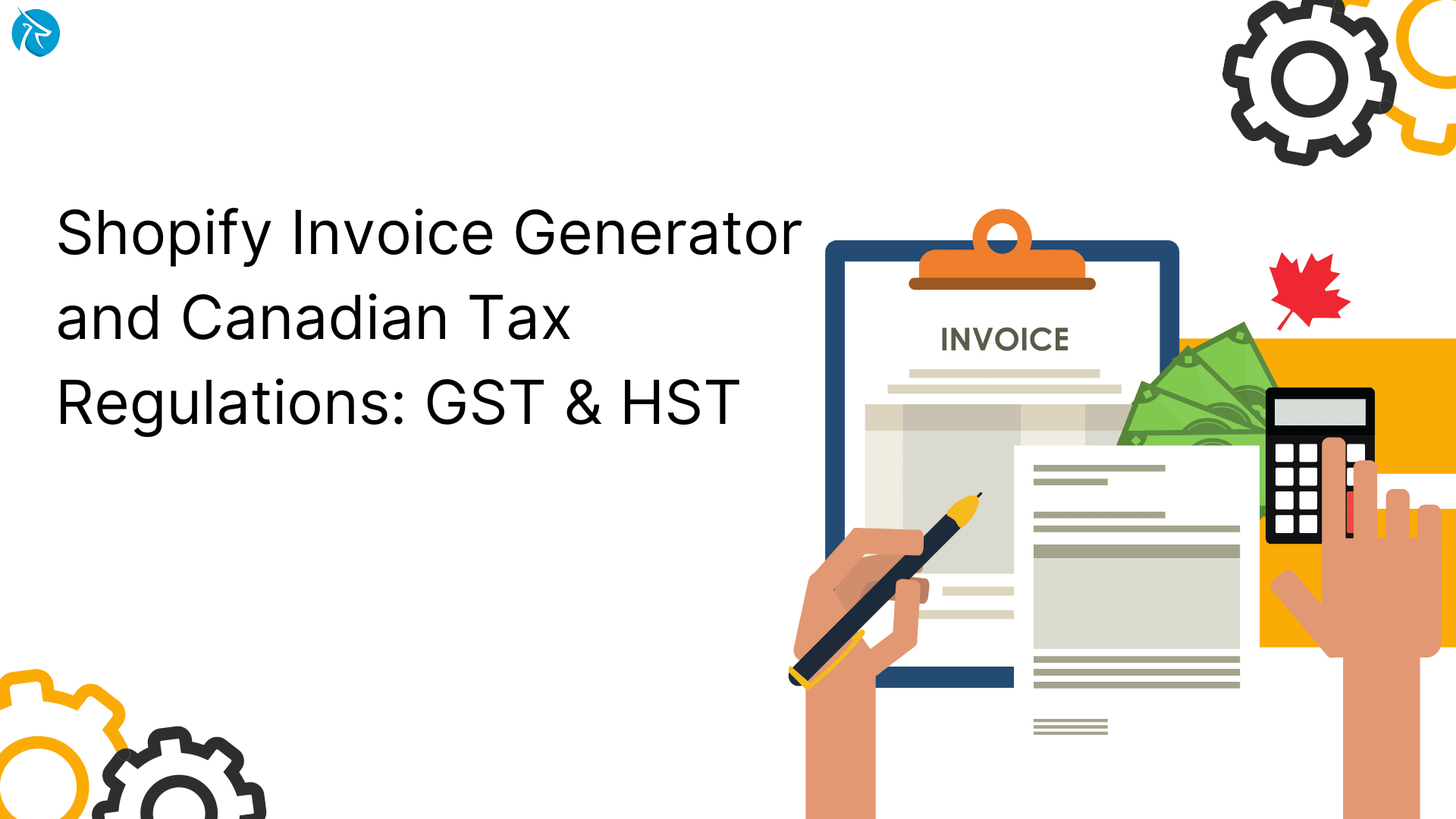
Setting up shops with platforms like Shopify has become increasingly popular. However, as a Canadian business owner, it's crucial to understand and comply with the tax regulations in the Great White North.
In this blog post, let’s delve into the essentials of the Shopify Invoice Generator and how it plays a pivotal role in adhering to Canadian tax regulations, specifically Goods and Services Tax (GST) and Harmonized Sales Tax (HST) with Fordeer Commerce.
Understanding Shopify Invoice Generator
Definition of Shopify invoice generator
It is imperative to have an invoice in addition to purchase orders. The purpose of the Shopify invoice generator is to assist your company by creating invoices for the goods and services you offer. By eliminating the need for manual processing and maintaining uniformity in invoicing procedures, online invoicing allows you to save a lot of time while adhering to modern invoice standards.
We currently have access to software and technology that can help businesses run more effectively thanks to the advent of automation in a variety of industries. The invoicing procedure has also changed as a result of technological improvements.
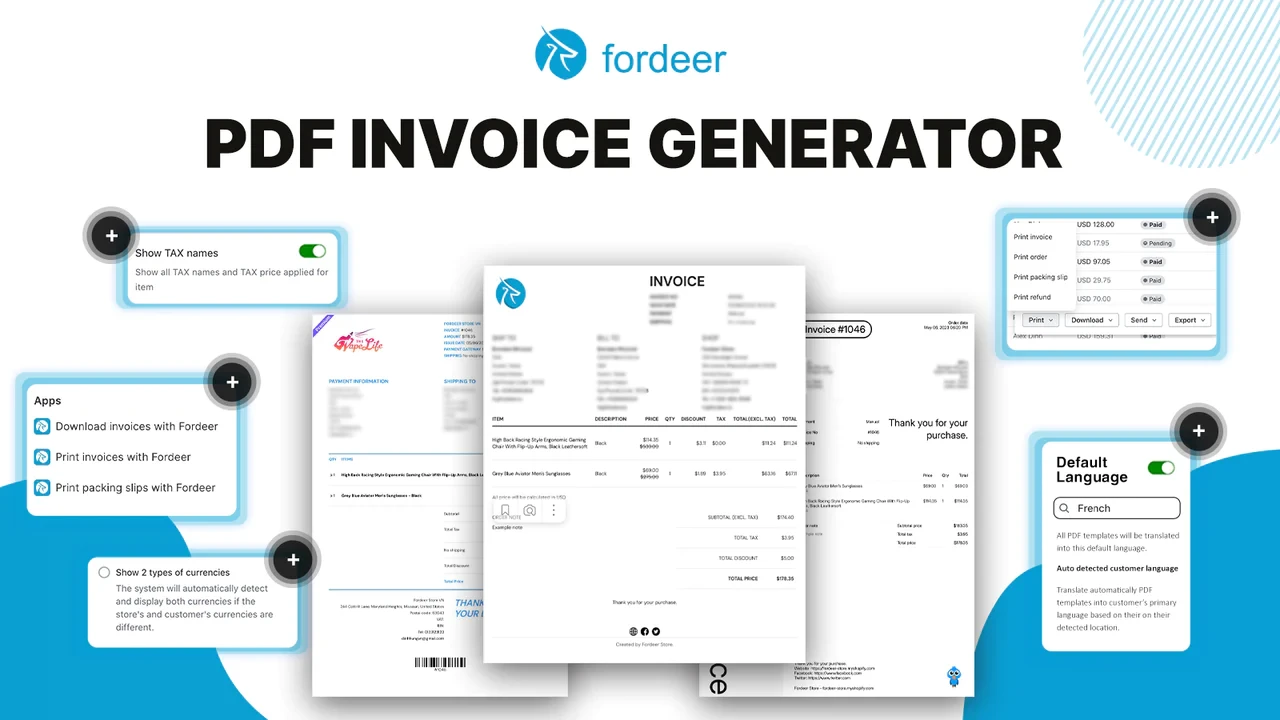
Generating invoices for clients is an essential part of running a business. This used to be a labor-and time-intensive procedure that was frequently carried out using off-the-shelf software and programmes.
Your invoices will look professional thanks to the Shopify free invoice generator tool, which also offers an easy way to include order details. Maintaining an accurate record of your unpaid bills is essential for order management and is required in the event of an audit.
Key features of Shopify invoice generator
Shopify's platform includes robust features for generating invoices and managing orders. Here are key features related to invoicing within Shopify:
Automatic invoice generation
Shopify automatically generates invoices for each order placed on your online store. This includes order details, customer information, and a breakdown of the products or services purchased.
Customization options
Shopify provides customization options for your invoices. You can include your business logo, adjust the layout, and add personalized messages to make the invoices align with your brand.
Tax calculation
The platform automatically calculates applicable taxes based on the customer's location. This is crucial for businesses operating in regions with specific tax regulations, such as GST (Goods and Services Tax) or HST (Harmonized Sales Tax).

Real-time updates
Shopify regularly updates its system to reflect changes in tax rates or other relevant regulations. This ensures that the calculated taxes on your invoices remain compliant with the latest requirements.
Email notifications
Once an order is placed, Shopify can automatically send email notifications to customers containing the invoice and order details. This helps keep customers informed and provides them with a clear record of their purchases.
Record-keeping
Invoices generated by Shopify serve as essential records for both the business owner and the customer. They include transaction details, making it easier to track sales, manage inventory, and maintain accurate financial records.
Integration with payment gateways
Shopify integrates seamlessly with various payment gateways, allowing customers to pay for their orders securely. The payment details are often included in the invoice, providing a comprehensive record of the transaction.
Accessibility and storage
Invoices can be easily accessed and managed through the Shopify admin panel. The platform typically provides a centralized location for storing and retrieving all invoices associated with your store's orders.
Understanding Canadian Tax Regulations: GST & HST
Definition of GST / HST
GST is short for Goods and Services Tax and HST is short for Harmonized Sales Tax. The majority of products and services supplied in Canada, along with many supplies of real estate and intangible personal property, are subject to the GST/HST sales tax. Businesses can typically claim input tax credits (ITCs) on GST/HST paid on goods utilized in commercial activities. Businesses are also responsible for collecting and remitting the GST/HST they charge to clients.
Goods and services sold in Canada are generally subject to the Goods and Services Tax (GST) or Harmonized Sales Tax (HST), which is included in their final price. The GST/HST is also applicable to real property, such as land and buildings, as well as intangible personal property like intellectual property rights, admissions, and digitized products downloaded over the internet.
Certain Canadian provinces incorporate the GST into a unified Harmonized Sales Tax (HST), amalgamating it with the provincial sales tax. For businesses operating in Canada, unless classified as a small supplier, it is mandatory to impose, collect, and remit GST/HST, along with any other relevant sales taxes. Additionally, businesses have the opportunity to recover the GST/HST spent on purchases used in commercial activities by claiming input tax credits (ITCs) on their returns.
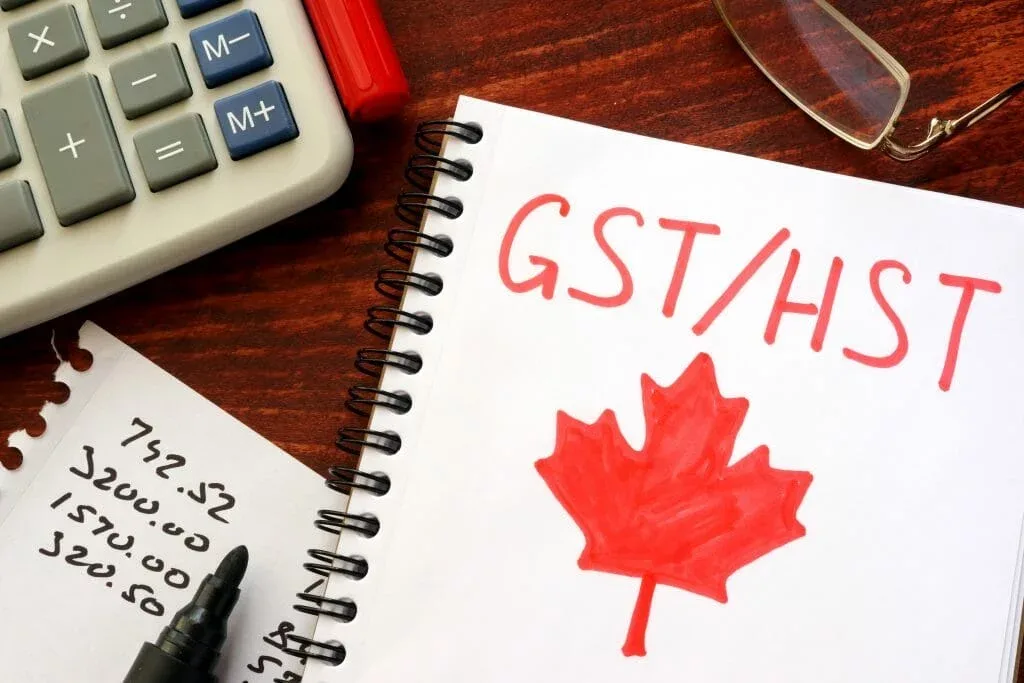
Entrepreneurs often find the regulations surrounding charging GST/HST and claiming refunds perplexing, according to the Canada Revenue Agency (CRA). The CRA notes, “GST/HST can become very complex, very quickly. Business owners are often taken aback by the numerous rules governing the charging or recovery of the tax”.
Who to pay GST / HST
In Canada, the responsibility for paying the Goods and Services Tax (GST) and the Harmonized Sales Tax (HST) typically falls on businesses that are considered registrants for the purposes of these taxes. Here's a breakdown of who is generally required to pay GST/HST:
Businesses with taxable supplies
Businesses engaged in the provision of goods and services that fall within the scope of taxable supplies are generally obligated to register for and collect Goods and Services Tax (GST) or Harmonized Sales Tax (HST). These taxable supplies encompass a broad spectrum, including the sale of goods, professional services, and digital products.
Threshold for registration

The requirement for GST/HST registration is often contingent upon the annual worldwide taxable revenues of a business. As of my last knowledge update in January 2022, businesses surpassing the $30,000 threshold must mandatorily register for these taxes. This threshold is evaluated annually, making it crucial for businesses to monitor their revenue to ensure compliance.
Voluntary registration
Even if a business does not surpass the mandatory threshold, voluntary registration for GST/HST is an option. Opting for voluntary registration can be particularly beneficial for businesses looking to claim input tax credits (ITCs), allowing them to recover the GST/HST paid on business expenses. This proactive approach can enhance financial management and contribute to overall tax efficiency.
Certain small suppliers
Small suppliers, defined as businesses with annual worldwide taxable revenues of $30,000 or less, are exempt from the mandatory requirement to register for and collect GST/HST. However, even small suppliers have the flexibility to opt for voluntary registration. Understanding the implications of registration, even for smaller businesses, is essential to make informed decisions aligned with the business's growth strategy.
Non-resident businesses
Non-resident businesses engaging in activities within Canada may find themselves obligated to register for and collect GST/HST on their taxable supplies. This requirement applies to businesses that carry on business in Canada, irrespective of whether they maintain a physical presence in the country. Non-resident businesses should be cognizant of these obligations when entering the Canadian market.
Specific industries and transactions
Certain industries or specific transactions may be subject to unique rules or exemptions related to GST/HST. This complexity reinforces the importance of businesses understanding the intricacies of their specific sector to ensure accurate tax compliance. Staying informed about any industry-specific regulations or exemptions is crucial to navigating the nuanced Canadian tax landscape.
Once a business is registered for GST/HST, the responsibility involves charging and collecting the applicable tax on their taxable supplies. Furthermore, businesses are required to remit the collected tax to the Canada Revenue Agency (CRA) on a regular basis, typically quarterly or annually, depending on the annual taxable revenues.
Shopify’s Invoicing aligns seamlessly with Canadian Tax Landscapes
Shopify's robust invoicing system stands out as a crucial tool for e-commerce businesses navigating the complex terrain of Canadian tax regulations. This platform not only facilitates the creation of professional and customized invoices but also ensures seamless alignment with the nuances of Goods and Services Tax (GST) and Harmonized Sales Tax (HST) in the Canadian tax landscape.
One of the standout features of Shopify's invoicing functionality is its automatic tax calculation. By leveraging geolocation technology, the platform accurately determines the customer's location, enabling the automatic application of the appropriate GST or HST rates. This dynamic feature not only eliminates the risk of miscalculations but also ensures that businesses remain in strict compliance with Canadian tax regulations.
Furthermore, Shopify's invoicing capabilities extend to customization, allowing businesses to tailor their invoices to include all necessary information mandated by the Canada Revenue Agency (CRA). This not only enhances the professional appearance of the invoices but also ensures they contain all the requisite details for tax compliance, creating a seamless and user-friendly experience for both businesses and customers.
Real-time updates are another integral aspect of Shopify's invoicing system. As tax regulations are subject to change, Shopify consistently updates its platform to reflect the latest requirements, sparing businesses the need for manual adjustments and helping them stay current with the evolving Canadian tax landscape.
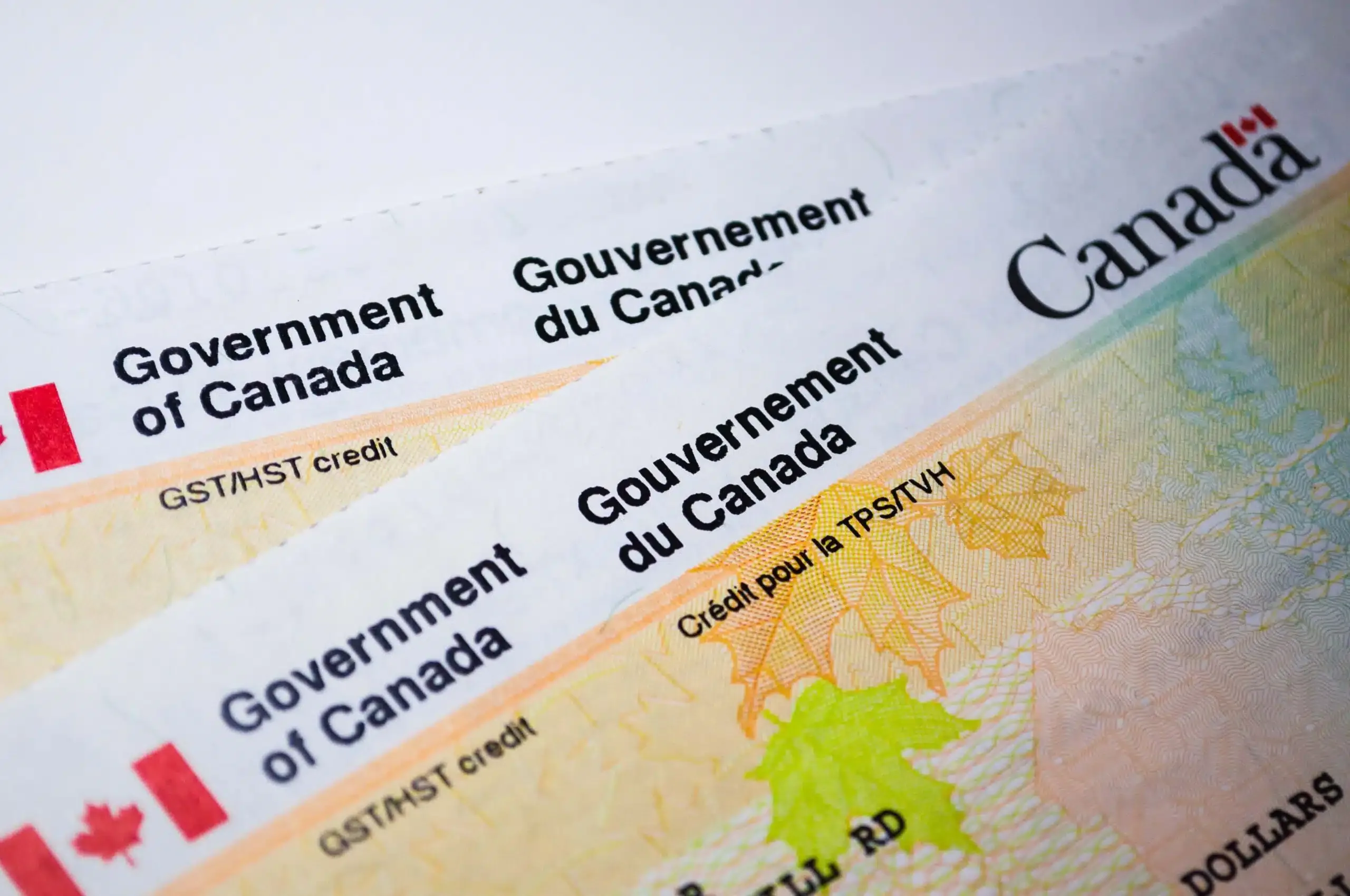
This alignment with Canadian tax regulations is particularly advantageous for businesses operating in provinces that utilize Harmonized Sales Tax (HST). The platform adeptly navigates the complexities of HST by automatically adjusting tax rates based on the customer's province, thus streamlining the invoicing process for businesses in HST-implemented regions.
You can align seamlessly with the Canadian tax landscape by taking our Fordeer PDF Invoice Generator for example. This Shopify invoice generator supports your businesses in building a brand with a professional PDF invoice template by picking one dazzling from our gallery, tailoring the invoice to fit your brand, and so much more.
Over to you,
As a Canadian eCommerce entrepreneur, understanding and complying with GST and HST regulations is paramount. The Shopify Invoice Generator serves as a powerful ally, automating tax calculations and helping you generate professional, compliant invoices. By leveraging this tool, you can focus on growing your business while remaining confident that your invoicing practices align with Canadian tax regulations.
Stay informed, stay compliant, and watch your Shopify business thrive in the Canadian market by following the Fordeer Team!
- Install Fordeer Apps for Free
- Get immediate assistance by chatting with us.
- Join Fordeer Commerce Community for fresh app updates, expert tips, and private deals.







